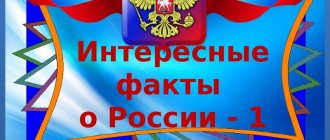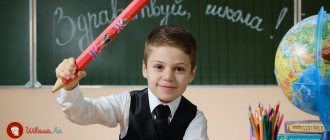MAGAZINE Preschooler.RF
Short-term project with pupils of the preparatory group “My Motherland - Russia”Developed and implemented by the teacher of the secondary group “Rainbow” of the MDOU “Kindergarten No. 6 “Solnyshko” Teselkina Ekaterina Sergeevna
Municipal preschool educational institution “Kindergarten No. 6 “Solnyshko” June 2022, Semenov
Project classification. By method: frontal.
Topic: educational and informational.
According to the implementation period: short-term.
Scheme of interaction between participants in the project implementation process
Relevance
Why is this project relevant?
- It is known that in the comprehensive development of a preschooler, one of the central places in the upbringing of a child is played by the moral and patriotic aspect. long-term, systematic and targeted impact on the child. Developing an attitude towards the Motherland begins in childhood, when the foundations of a value-based attitude towards the world around us are laid. The task of adults is to not only evoke in children a feeling of admiration for their hometown, their native country, but also a feeling of respect for their people, a sense of pride in their country.
- Problem. During the educational process, a problem emerged that children know little about their homeland. Also, children have an underdeveloped sense of love for their country.
- Hypothesis. We decided to implement the project “My Motherland Russia” ! This will expand and deepen children’s knowledge about their country and will serve to develop a caring attitude towards it. In working together with parents, we must increase the child’s patriotic consciousness, stimulating his interest in helping adults, being active in public life, thereby stimulating the child’s feelings. It is very important that a child can appreciate the help of adults and participate in the life of his small homeland, part of the common country.
- Moral and patriotic education (education) of parents is one of the extremely important and at the same time one of the most difficult areas of work of a preschool institution. One of the primary tasks is to involve adult family members (even grandparents to a greater extent than busy dads and moms) in working together.
- The project activities of our preschool educational institution have been successfully implemented for several years and the work is aimed not only at children, but also at parents and allows us to combine the interests of all participants in the educational process: parents, children and teachers
Goals.
- To form children's ideas about their country - Russia.
- To consciously promote the development of parents of pupils - the correct attitude towards their homeland, the desire to practically preserve, support, create the necessary conditions for them, i.e. competence in matters of moral and patriotic education.
Tasks:
- To develop knowledge about Russian symbols (coat of arms, flag, anthem), sights of the country
- To form initial ideas about the peoples, about the heterogeneous composition of the country.
- Introduce Russian holidays and traditions of the Russian people.
- Teach children to respect their country.
- To develop children's productive activities and children's creativity on the topic of the project.
- Develop verbal skills to compose a descriptive story based on a model.
- To develop children’s interest in artistic and musical works (poems, tongue twisters, sounds of wildlife, songs) on the topic of the project.
- To increase the interest of parents in the productive activities of children, the desire to participate in the selection of visual teaching aids, demonstration material to enrich children’s impressions and the subject-spatial environment on the topic of the project.
Expected results of working with children.
- They can confidently name their country using Russian symbols
- Can tell interesting facts about holidays
- Expresses his desire to depict Russian symbols in sculpting, drawing, and appliqué
- Actively participates in conversations on the topic of the project, asks questions of interest
- In independent activities he reflects the information received, looks at albums and books about Russia with interest
- They participate with interest in outdoor games on this topic of the project.
- Ask parents for additional information on the topic of the project.
Expected results of working with parents.
- Competencies have been developed in familiarizing middle-aged preschoolers with their native country
Project activity product:
Entertainment on June 12, Russia Day.
Project development
Implementation stages.
Stage 1. Organizational and preparatory stage.
Educator: Determining the topic of the project, setting goals and objectives; Studying methodological literature. Drawing up a long-term plan for working with children, selecting literary works; selection of conversations; preparation of methodological and didactic materials, video and audio materials. Preparation of presentations on the project topic. Design of folders for parents on the topic of the project, selection of literature.
Stage 2. Cognitive and creative.
- Selection of photographic material about Russia
- Development of a scenario for the final event
- Compiling a list of didactic games on this topic
- Creation of a card index of didactic games on the topic of the project
- Development of NOOD
- Determining the content of topics for conversations with children
- Compiling a list of fiction about Russia used in the project
- Making didactic games on this project topic
- Creation of a card index of outdoor folk games
- Compiling a list of riddles about Russia
- Compiling a list of poems about Russia
- Development of a diagnostic card
- Registration of information in the parent corner.
Stage 3 final:
Reflection on the activities carried out on the project (analysis of the results of project activities based on the objectives and predicted results of the project)
Project implementation
- Block of work with children
Stage I – analytical – 06/01/2021
- Problem Definition
- Defining Project Objectives
- Studying methodological literature.
- Drawing up a long-term plan for working with children
- Attracting the attention of parents to the project to collect illustrative material about their native country
Stage II – project development 06/03/2021
- Questioning parents
- Selection of photographic material about Russia
- Development of a scenario for the final event
- Compiling a list of didactic games on this topic
- Creation of a card index of didactic games on the topic of the project
- Development of NOOD.
- Determining the content of topics for conversations with children
- Compiling a list of fiction about Russia used in the project.
- Making didactic games on this project topic
- Creation of a card index of outdoor folk games
- Compiling a list of riddles about Russia.
- Compiling a list of poems about Russia
- Development of a diagnostic card.
- Registration of information in the parent corner.
- Diagnostics of children's knowledge about the country at the beginning of the project
Criteria:
- Names our country
- Recognizes the coat of arms and flag of Russia
- Names Russian holidays
- Knows interesting facts from the history of the country
- Can depict the image of a flag in drawing, sculpting, or appliqué
Stage III – project implementation
04. 06. 2021
- Teacher's story about his native country
- Looking at an album with photographic materials “Russia”
- Story-role-playing games: “Border Guards” , “Scouts” , “Sailors”
- D/games “An extra poop tray” “Find the painting that I tell you.”
- Conversations “Russian crafts, “Folk toys”
- Examination of illustrations depicting the defenders of Russia
- Design of a screen for parents “Child and moral and patriotic education.
- Game “Cut pictures” : “Coat of arms” , “Flag”
- 06. 2021
- NOOD for modeling: “Flag” (plasticineography)
- Review of the album “Russian Symbols”
- Didactic games “Recognize the flag by description” , “Recognize the coat of arms among other coats of arms”, “Find the same nesting doll” , “Complete the sentence about the flag”
- Organized activity in the educational field “Artistic creativity” : drawing “Flag”
- An evening of riddles about Russian holidays
- Reading poems about Russia.
- Educational conversation on the topic “Our holidays”
- Outdoor games “Geese and swans” , “Burners” , “Tag”
- 06. 2021
- Involving parents in the production of game attributes
- Reading fiction about Russia: Stories: M. Zhestev “The beginning of everything” , E. Shim “Where is our village” , learning A Prokofiev “Like on a hill, on a mountain” , Fairy tale “Sister Alyonushka and brother Ivanushka”
- Recommendations for parents on reading Russian folk tales
- Finger games: “Motherland” , “We are Russians” .
- Independent activity to design “My City”
- Listening: “Birdsong” Etude “Oh, you, Russian birch!” rus. adv. melody.
- Making crafts and drawings together with children “Homemade sketches about Russia”
- 06. 2021
- Organized activities in the educational field “Artistic and aesthetic development” : Listening to the anthem.
- NOOD for the “Flag” (broken)
- Organized activities in the educational field “Artistic Creativity” : modeling “Birch - a symbol of Russia”
- Recommendations for parents on viewing the landscapes of their native country with their children
- 06. 2021
- Organized activities in the educational field “Artistic Creativity” : modeling “Birch - a symbol of Russia”
- “We are Russians” in kindergarten .
- Conversation - generalization "How can we help our country."
- Booklet “Did you know that...” (interesting facts)
- Diagnostics of children's knowledge about Russia at the end of the project
IV stage – final stage – 06/11/2021
Entertainment on June 12th Russia Day
Diagram of children’s understanding of Russia
- – knowledge about Russia at the beginning of the project
- – knowledge about Russia at the end of the project
Project presentation
- Presentation of the project as a replication of work experience within the preschool educational institution
- Participation in the district competition of professional skills to create project activities in preschool educational institutions, dedicated to issues of moral and patriotic education
During the project, the children gained knowledge about their country, learned that it is inhabited by many peoples. The children enjoyed looking at Russian symbols, a map of Russia, looking for various cities, studying animals living on the territory of the Russian Federation.
Bibliography
- Aleshina A. N., “Acquaintance with the world around us . – M: Sphere shopping center.
- BarannikovaO. N. “Lessons in citizenship and patriotism in kindergarten: A practical guide . – M: ARKTI, 2007.
- Veraksy N. E. “Basic educational program of preschool education “From birth to school” . Mosaic-synthesis, M: 2015.
- Golovin N. “My first story” . – M, 1993
- Danilina G. N. “For preschoolers - about the history and culture of Russia” : A manual for the implementation of the state program “Patriotic education of citizens of the Russian Federation” - M: ARKTI, 2005.
- Degtyarev A. Ya. “History of the Russian flag: legends, facts, disputes” , M: Inteltekh LLP, Sunday, 1994.
- Kovaleva G. A. “Raising a little citizen . - M: ARKTI, 2005.
- Kondrykinskaya L. A. “For preschoolers about the defenders of the Fatherland . Methodological manual on patriotic education in preschool educational institutions. – M: Sfera shopping center, 2006.
- We live in Russia. Civic and patriotic education of preschool children N. G. Zelenova, L. E. Osipova M., 2007.
- Novikov S.V., Novikova E.P. “Native history” . – M: Eksmo, 2004.
- Moral education in kindergarten. V. G. Nechaeva.
- Rivina E. K. “Coat of arms and flag of Russia: Introducing preschoolers and primary schoolchildren to State symbols . – M: ARKTI, 2002.
- Soloviev V. “History for children and adults” . — M: White City, 2003.
- Me and the world. Lesson notes on social and moral education of preschool children, Mosalova L. L., - St. Petersburg: Detstvo-Press, 2011
| Next > |

